Zimbabwe
He is one of the continent’s longest-serving leaders. He is the only executive president his country has ever known. It’s been over three decades in charge of the southern Africa country, yet Robert Mugabe shows no signs of slowing down.
His party has said it will field him in next years’ polls and Mugabe has said he will not let the people down, that he is a man of the people.
“They (the people) want me to stand for elections, they want me to stand for elections everywhere in the party … The majority of the people feel that there is no replacement, successor who to them is acceptable, as acceptable as I am,” he said in an interview early this year.
Majority of Zimbabweans, going by Mugabe’s claim, still want the nonagenarian to continue in power. Full name Robert Gabriel Mugabe, the 93-year-old finally resigned his post, a week after the army took over reigns of government.
He represents different ideals to different people but there has been widespread celebrations at the news of his resignation.
Africanews looks back on the major points of the life of the independence freedom fighter, Prime Minister and President of Zimbabwe.
NOTE: This article was first published in February 2017 when Mugabe turned 93 years.
1. Robert Gabriel Mugabe was born on 21 February 1924. His father, Gabriel, was a carpenter and his mother was a teacher
2. He attended Kutama College in the then Southern Rhodesia (present-day Zimbabwe) before continuing to the University of Fort Hare in South Africa’s eastern Cape.
3. A teacher by profession he was jailed in 1964 for 10 years for fighting white minority rule in what was then Rhodesia.
4. After his release, he went into exile in Mozambique where he and fellow nationalist leader Joshua Nkomo joined forces to form the Patriotic Front guerrilla alliance to fight the white regime led by Prime Minister Ian Smith.
5. Together with Nkoma, they agreed on talks with British government leading to the Lancaster House Agreement which saw a transition to black majority rule.
Minus dos Santos: Here are Africa's longest serving presidents still going strong – africanews https://t.co/R0xuH3FIT2
— Mugabe in the News (@mugabenews) October 5, 2017
6. In 1980, Mugabe was elected as first black Prime Minister of Zimbabwe, a post he held for 7 years.
7. But there were tensions between Mugabe’s Zimbabwe African National Union (ZANU) and Nkomo’s Zimbabwe African People’s Union (ZAPU). Mugabe defeated ex-ZAPU rebels
8. In 1987, a fresh round of talks led to a merger of ZANU and ZAPU creating a one party state, three years on, Mugabe stood unopposed and was elected Executive President of Zimbabwe – he incorporated the position of Prime Minister, President and Commander of the Armed Forces.
9. Mugabe won re-election in March 1996 after again standing unopposed, his two challengers having withdrawn their candidacy shortly before polling day.
10. In August 1996, at the age of 72, Mugabe married his 31-year-old former secretary Grace Marufu in a lavish wedding ceremony attended by over 15,000 guests, including African leaders and barefoot villagers. Mugabe’s first wife Sally died in 1992.
11. Mugabe’s first political defeat was in February 2000 when voters in a referendum rejected a new constitution that would have given him yet more powers.
12. In the same year he turned on the small white minority, blaming them for the referendum defeat. He pushed legislation through parliament allowing the seizure of more than half the white-owned farms and did nothing to stop self-styled war veterans, many of them too young to have fought in the liberation conflict, from occupying farms, often with violence.
13. In June that year Mugabe’s ZANU-PF party narrowly won parliamentary elections, gaining 62 parliamentary seats to the opposition MDC’s (Movement for Democratic Alliance) 57 seats.
14. But in 2002, Mugabe succeeded in beating the MDC’s candidate Morgan Tsvangirai in violence-scarred presidential elections condemned by observers as flawed and unfair. Zimbabwe was subsequently suspended from the Commonwealth and Western countries imposed travel and economic sanctions on Mugabe and his government.
15. Mugabe’s “Operation Restore Order” in 2005 attracted further international condemnation as 700,000 people, largely urban supporters of the MDC, lost homes and businesses in mass evictions.
Zimbabwe’s powerful and controversial First Lady: Grace Mugabe https://t.co/qtISzOyXAi
— africanews (@africanews) August 16, 2017
16. On his birthday a decade ago, February 2007, Mugabe vowed United States President George W. Bush and British Prime Minister Tony Blair would never bring about a regime change in Zimbabwe. He has continued to accuse western forces of attempting regime change.
17. In 2008, the ZANU-PF lost in both presidential and parliamentary elections. Tsvangirai’s MDC claimed an outright victory but the elections body said there was the need for a run-off vote. The MDC boycotted the polls and Mugabe won by 85% in the run-off.
18. In September 2008, regional leaders of the SADC backed a power sharing deal between brokered by ex-South African president, Thabo Mbeki. Mugabe, an opposition chief, Arthur Mutambara and Tsvangirai signed the deal to end the violent political crisis.
19. Mugabe was recognised as president, and Tsvangirai as prime minister. The MDC would control the police, the ZANU-PF the Army, and Arthur Mutambara became deputy prime minister. The deal fell apart before the next elections in 2013.
20. Mugabe won the 2013 polls by a landslide and also won back their parliamentary majority. Mugabe signed a new constitution into law in May the same year after it received overwhelming approval in a referendum in March.
The charter imposed restrictions on presidential powers and a two-term limit. The new rules were not applied retroactively however, theoretically allowing Mugabe to rule for a further decade.



![[Profile] Robert G. Mugabe: Zimbabwe freedom fighter, Premier and President](https://static.euronews.com/articles/358477/400x225_358477.jpg)

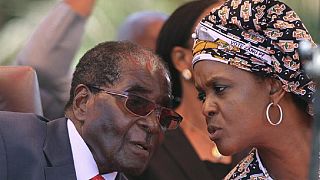
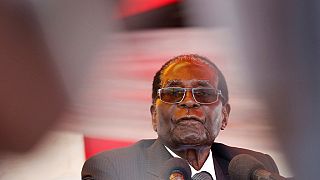
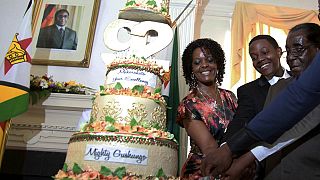

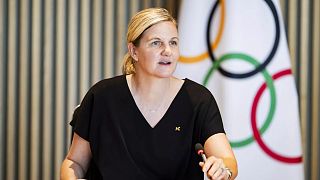
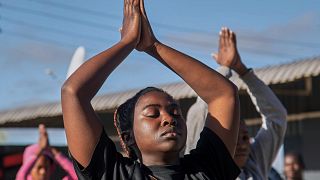



01:04
Turkish democracy under pressure: Erdogan's top rival sentenced to two years in prison.
02:23
Cameroon: Mixed reactions in Yaoundé after Biya announces bid for another term
01:11
World leaders express condolences over death of Nigerian ex-president Muhammadu Buhari
Go to video
Togo protest crackdown raises fears of worsening political crisis
Go to video
Tunisia sentences prominent opposition leader to 14 years in prison
01:09
Liberian president issues official apology to civil war victims